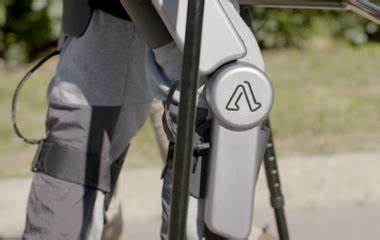EIT Health-supported ABLE Human Motion receives CE mark

The ‘ABLE Exoskeleton’, created by EIT Health-supported start-up ABLE Human Motion, based in Barcelona, has recently obtained a CE Mark under the new Medical Device Regulation (MDR) for spinal cord injury (SCI) rehabilitation.
This signifies the ABLE Exoskeleton has been assessed to meet high safety, health, and environmental protection requirements.
This regulatory approval paves the way for this lightweight, adjustable, and affordable hip-knee-powered exoskeleton to be sold commercially throughout the European Union. Hospitals and rehabilitation centres will be able to provide patients with SCI with this evidence-based technology and the best practices for rehabilitation.
How will the ABLE Exoskeleton help?
SCI is a life-changing condition that impacts various bodily functions and often leads to sensory and motor impairments, frequently accompanied by long-term immobility. It may be caused by an accident or biological condition such as disease, infection, or tumour.
Every year, up to 930 000 people worldwide experience lower spinal cord injuries due to illness or accidents, profoundly altering their lives and those of their families. This multifaceted condition has significant physical, emotional, and financial implications.
Robotic exoskeletons emerged recently as a promising solution for patients with SCI, enabling motor learning-based training with a minimal physical burden to therapists. These wearable devices facilitate tasks such as standing, walking, turning, and sitting down, thereby enhancing mobility and improving overall quality of life for those living with SCI.
How EIT Health helped ABLE Human Motion
EIT Health has played crucial role in nurturing ABLE Human Motion’s growth and development, providing support and funding, facilitating collaborations with expert clinicians and ensuring the involvement of SCI patients in the product development process. ABLE Motion has participated in several EIT Health programmes which are aimed at helping start-ups realise their potential.
Thanks to EIT Health, the ABLE Exoskeleton consortium received EUR 2.8 million in funding between 2020 and 2022 which helped validate and certify the ABLE exoskeleton with SCI patients in a hospital setting, and clinical trials with the device were successfully conducted in leading neurorehabilitation hospitals in Germany and Spain.
EIT Health has supported ABLE with multiple instruments along the journey, providing access to early-stage funding, mentoring from healthcare experts from all over the value chain and a network of partners, including top-notch hospitals, universities and businesses around Europe. Thanks to them, the clinical trials of the ABLE Exoskeleton were conducted in two leading neurorehabilitation hospitals in Germany and Spain, which has given us a lot of credibility and recognition in the field.
Alfons Carnicero, Co-Founder and CEO, ABLE Human Motion


 Share this page
Share this page


